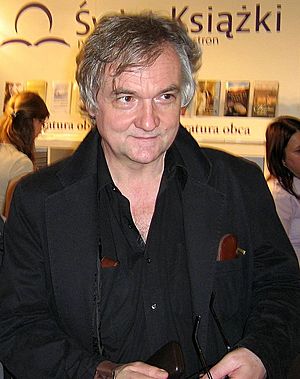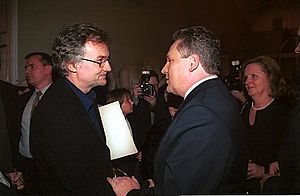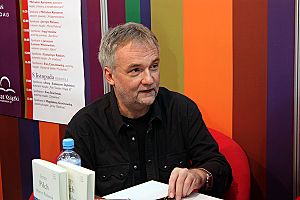Jerzy Pilch facts for kids
Quick facts for kids
Jerzy Pilch
|
|
|---|---|
 |
|
| Born | 10 August 1952 Wisła, Poland
|
| Died | 29 May 2020 (aged 67) Kielce, Poland
|
| Alma mater | Jagiellonian University |
| Occupation | Writer, journalist |
| Awards | Nike Award (2001) Paszport Polityki Award (1998) Kościelski Award (1989) |
Jerzy Pilch (born August 10, 1952 – died May 29, 2020) was a famous Polish writer, columnist, and journalist. People often compared his writing style to other great authors like Witold Gombrowicz. He was known for his unique way of telling stories.
Early Life and School

Jerzy Pilch grew up in a small town called Wisła in southern Poland. He studied Polish language and literature at the Jagiellonian University in Kraków. In the late 1970s, he became part of a secret group of writers in the city.
In the 1980s, Poland was under martial law. This meant the military was in control. During this time, Pilch became known for his essays. He wrote and read them for a special "spoken magazine" called Na Głos ("Out loud"). This event was organized by the "Club of Polish Catholic Intellectuals." This group often disagreed with the government. Even though the club was Catholic, Pilch himself was a Lutheran, which is a type of Christian.
His Writing Career
In 1989, Pilch started writing funny and thoughtful essays for a weekly newspaper called Tygodnik Powszechny. These writings made him a well-known public figure. He was someone who shared his ideas and opinions with many people.
His best essays from Tygodnik Powszechny were collected into three books. These books included Rozpacz z powodu utraty furmanki ("Despair caused by the loss of a wagon") from 1994. Another was Tezy o głupocie, piciu i umieraniu ("Theses On Stupidity, Drinking and Dying") from 1995. The third was Bezpowrotnie utracona leworęczność ("The Irreversible Loss of Left-handedness") from 1998.
In 1995, a famous actor named Jerzy Stuhr made one of Pilch's novels into a movie. The movie was called List of Lovers. It was Stuhr's first time directing a film.
That same year, Pilch published his third novel, Inne rozkosze ("Other Pleasures"). This book was later translated into English as His Current Woman in 2002.
Pilch stopped working for Tygodnik Powszechny in 1999. He also left Kraków and moved to Warsaw. There, he began writing a regular column for another weekly magazine called Polityka. A collection of these writings was published in 2002. It was titled Upadek człowieka pod Dworcem Centralnym ("The Fall of Man in Front of the Central Station").
His most popular book was his fourth novel, Pod Mocnym Aniołem ("The Mighty Angel"), published in 2000. This book was a humorous look at life's challenges. It won the Nike Award the next year. The Nike Award is a very important Polish literary prize. In 2009, this book was also translated into English as The Mighty Angel. Another of his books, Tysiąc spokojnych miast, was translated as A Thousand Peaceful Cities in 2010.
Many of Pilch's books have been translated into different languages. These include English, French, Spanish, and Russian.
Death
Jerzy Pilch passed away on May 29, 2020. He died from problems related to Parkinson's disease.
See also
- Andrzej Stasiuk
- Polish literature
- List of Polish writers


